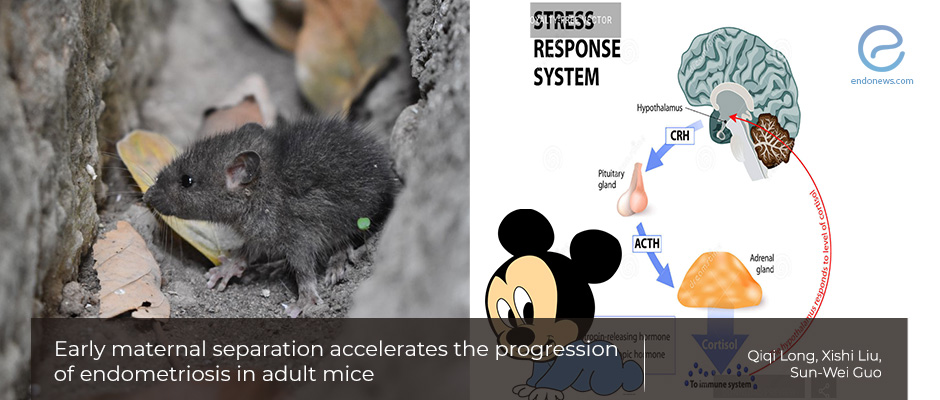Early maternal separation and endometriosis progression in adult mice
Aug 3, 2020
Maternal separation during infancy contributes to the development and progression of endometriosis through hyperactivity of neuronal pathways.
Key Points
Highlights:
- Separation from the mother in early life increases the anxiety and depression levels through the hypothalamic-pituitary-adrenal axis.
- This unfavorable environmental event results in the development and progression of endometriotic lesions in mice.
Importance:
- The results of this study suggest that "early life adversity", such as maternal separation has a long-term detrimental effect on adult health through sensitization or enhanced vulnerability to subsequent stressors, and may result in the progression of endometriosis lesions through endometriosis-associated hyperalgesia and increased angiogenesis.
What’s done here?
- This study was conducted on the female newborn pubs to investigate the impact of maternal separation on the behavioral change and progression of endometriosis.
- The pubs were divided into 2 groups: the maternal separation group and the no separation (control) groups.
- Endometriosis was induced on each group by intraperitoneal injection of uterine fragments, and the lesions excised 4 weeks later were evaluated by immunohistochemistry.
- Depression-related behaviors, anxiety-related behaviors, and thermal pain sensitivity were evaluated.
Key results:
- Anxiety and depression levels were higher in the maternal separation group compared with the control group.
- The size and total weight of excised endometriotic lesions were significantly increased in the maternal separation group compared to controls.
- Thermal pain sensitivity was reduced in the maternal separation group following the induction of endometriosis.
- The maternal separation resulted in a significant change in the microvessel density, and the extent of fibrosis.
Strengths and Limitations
- This study was not a mechanical study to understand why maternal separation accelerates the progression of endometriosis.
- The most critical and vulnerable time during the infancy, or the minimal length of maternal separation to promote endometriosis progression was not investigated.
- The ways to recover the negative impact of maternal separation were not identified.
- This study is the first one to confirm the association between maternal separation during infancy and behavioral changes in mice to accelerate the endometriosis.
Lay Summary
The quality of life in the women affected by endometriosis depends on the symptoms and signs of endometriosis such as dysmenorrhea, dyspareunia, chronic pelvic pain, and infertility. Although several studies have been performed to investigate the underlying pathophysiologic mechanism, it is still poorly understood.
Early-life adversity including abuse, neglect, loss of a parent, and traumatic events has been found to be associated with the development and progression of endometriosis. Preterm birth, formula feeding, intrauterine exposure to diethylstilbesterol, and childhood physical abuse are also proved to be associated with endometriosis.
Long et al., from China, published a study entitled “Early maternal separation accelerates the progression of endometriosis in adult mice” in the journal "Reproductive Biology and Endocrinology". The authors aimed to evaluate whether there is a negative impact of maternal separation on the development and progression of endometriosis.
Because human studies are difficult to conduct with this aim, this study has been designed in mice. The authors evaluated the depression and anxiety-related behavioral changes in pubs following the separation from their mothers.
The endometriosis was induced in the pups through ab intraperitoneal injection of uterine fragments from donor mice for four weeks. The level of anxiety and depression was higher in the maternal separation group through altered neuronal wiring and hyperactivity of the hypothalamic-pituitary-adrenal axis. The size and total weight of excised endometriotic lesions were significantly increased. Maternal separation also resulted in a significant change in the microvessel density and the extent of fibrosis in endometriosis lesions.
“Exposure of female mouse pups to stress during their infancy alters the activity of hypothalamic-pituitary-adrenal axis and increases depression as well as anxiety levels in adulthood.” the authors concluded.
Research Source: https://pubmed.ncbi.nlm.nih.gov/32532293/
endometriosis early life adversity maternal separation adrenergic receptor mice progression

